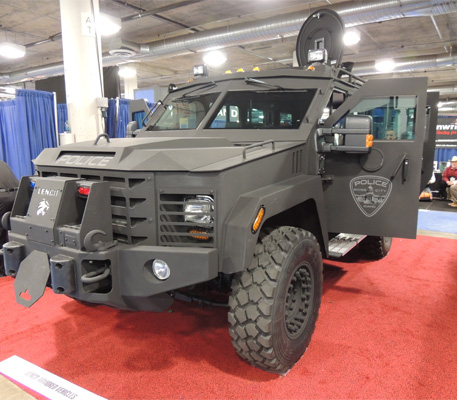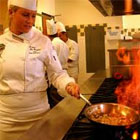I served as a Police Officer, Corporal, Inspector, Sergeant, Lieutenant and Captain from 1980 to June, 2011 in the SF Bay Area. In 1994, I was assigned to a regional SWAT Team as a Team Leader and Sniper. I became a Team Commander in 1999. When I retired, I was the senior Commander and Sniper Team Commander for the largest regional team in California. I now teach Administration of Justice at Skyline College and I'm the On-Screen Team Lead for www.GuardAmerican.com, a firearms training website.
I loved my job. It was so much a part of my life, 24 hours a day for over three decades, that leaving it was traumatic for me. Going from being "the man" who everyone calls in the middle of the night for guidance, direction, life-and-death decisions, responding code three to all manner of emergencies, going through doors with my men, adrenaline rushes, saving lives, etc, to the next day being completely out of the loop and sidelined, was very difficult for me. Other cops can't wait to retire and are very happy once they leave police work. In a way, I'm jealous of them. I would have done the job until they carted me off in a box.
Thanks Barry! :-)
Here is one of the areas where the training and mission is a bit different between military and police snipers. Military snipers generally fire at much longer ranges than SWAT snipers. Their goal is to kill enemy soldiers or combatants, and a chest hit at many hundreds of yards will do the trick. If they don't die immediately, no big deal.
When a SWAT sniper takes a shot at a hostage-taker (which is a very rare occurrance) the absolute requirement is to save the life of the hostage. If the suspect is holding a gun to the head of the hostage or holding a knife to their throat, a shot to the chest or leg or anywhere else will cause the suspect to flinch, pulling the trigger or jerking the knife. Dead hostage. Not good.
Therefore, SWAT snipers train for the only shot that will ensure that the suspect will NOT reflexively shoot the hostage, and that is a brain shot. It sounds gruesome, but this is the only thing that instantly incapacitates the central nervous system, causing all muscles to relax rather than contract. The trigger finger goes limp, the hostage is saved.
So, SWAT snipers have a much smaller aiming point (and are much closer) than military snipers, generally speaking.
And it is a common tactic for entry teams to "MOVE" on a sniper-initiated assault.
You're right, Joe. GuardAmerican strongly supports the Second Amendment. A fact that often surprises people is that the vast majority of cops across the country are also pro gun rights, with the exception of some big city chiefs who are doing rh bidding of the elected officials they work for, and some cops in large East Coast cities.
This is a perfect time to clarify some terminology. An assault weapon is a fully-automatic firearm. Thanks to ignorance (or wilfull disinformation by politicians and the media) we are led to believe that semi-automatic rifles are assault weapons, which they are not.
Next, the people who use any firearm to commit crimes are overwhelmingly people who are not allowed by law to possess that firearm, or any other kind. In other words, if someone is planning on committing mass murder, they are not going to care if the weapon they are using is legal for them to possess, or if they are bringing that weapon into a "gun-free zone" like the Aurora theater massacre or a school.
Statistically, semi-automatic rifles are used in a very small percentage of crimes. SWAT Teams facing a criminal armed with a rifle is even rarer.
Hi Clarke,
SWAT is a specialty assignment, like K9 Handler, Motor Officer, Evidence Tech, etc. Only larger cities have full-time SWAT Teams, like L.A. and New York. All they do is train and respond to incidents. As such, at most departments, being on SWAT is an added, part-time duty on top of the officer's regular assignment, whatever that might be.
SWAT is something you only do if you truly love it and want to do it. If the department you work for has a team, and an opening comes up, officers may submit a letter of interest. In most cases, the next step is a shooting test and physical agility test. If you fail those, you're out until the next opening. If you pass, most agencies will have an inteview conducted by SWAT Team Leaders and Commanders from your department and maybe members of your regional team from other departments.
If you get past all these hurdles, you go off to a basic SWAT school. Some are a week long, good ones are two weeks or more. Once you graduate, you begin regular training with your team. When the Team Leaders think you're ready, you can start responding to activations or "call-outs." Initially, you'll be on perimeter details until you have proven yourself worthy and safe enough to your team mates to be on the entry team. Absolute faith and confidence in your ability and heart by those trusting you with their lives is required. This is an honor not easily achieved, needless to say.
Many would-be SWAT candidates can't pass the shooting/PT/interview process, and not everyone who goes to SWAT School passes the course. I'm sure it varies widely by department, but a 20% success rate seems about right.
Private Detective
Police Officer
 Can I become a cop if I have misdemeanors on my record?
Can I become a cop if I have misdemeanors on my record?
Chef
 Has anyone ever found anything gross in their food on your watch?
Has anyone ever found anything gross in their food on your watch?
Brandy,
This is my specialty. Please email me at moaoperator@gmail.com and I'll lay out the justifications for your bosses. I may not be able to respond until Wednesday afternoon PDT.
Nick
Not being able to save every hostage is the worst. When it happens, we always second guess ourselves, wondering if we could have altered the outcome in some way by making different choices in split second, life-and-death situations under tremendous stress. In a recent hostage rescue, we saved two small children, but their mother was killed by the suspect before we could rescue her. It was awful.
Katee,
Wow...that is a tough one. I feel for him (and you) more than you can imagine. I retired from the PD and the team after a full career; it was not forced, but I still miss my job very much, especially the SWAT team and my brothers. I still haven't gotten over not being part of it anymore. One day, I was on-call 24-7, looked to for leadership and decision making, and the next day I was a civilian. It was (and is) very difficult for someone dedicated to this elite profession.
i guess what I'm saying is that I really can't offer any good advice, especially without knowing more about the circumstances of his retirement. You can reauch me at Nickgottuso@guardamerican.com if you feel comfortable sharing more personal background info with me. That might help me in assisting him.
Very sorry for his loss. I feel his pain.
-OR-
 Login with Facebook
Login with Facebook (max 20 characters - letters, numbers, and underscores only. Note that your username is private, and you have the option to choose an alias when asking questions or hosting a Q&A.)
(A valid e-mail address is required. Your e-mail will not be shared with anyone.)
(min 5 characters)
By checking this box, you acknowledge that you have read and agree to Jobstr.com’s Terms and Privacy Policy.
-OR-
 Register with Facebook
Register with Facebook(Don't worry: you'll be able to choose an alias when asking questions or hosting a Q&A.)